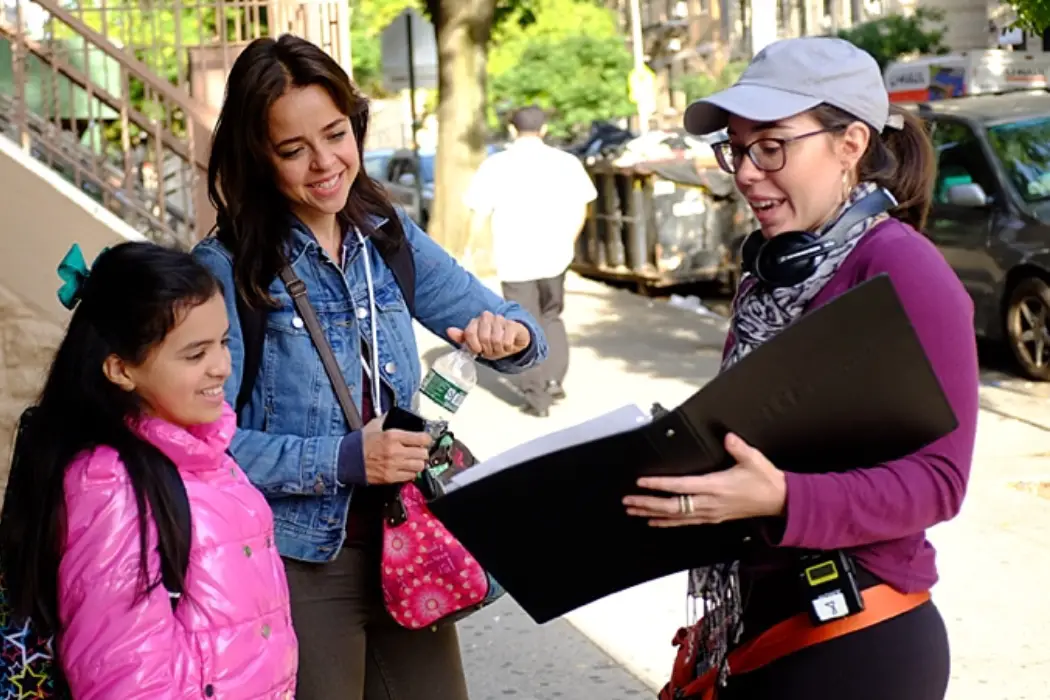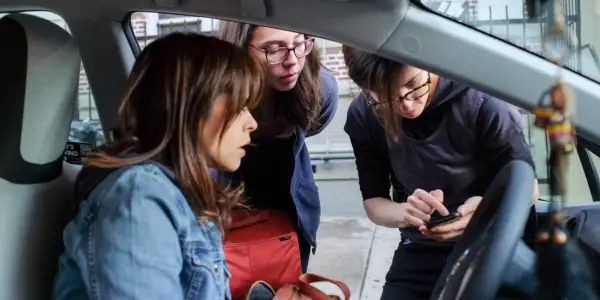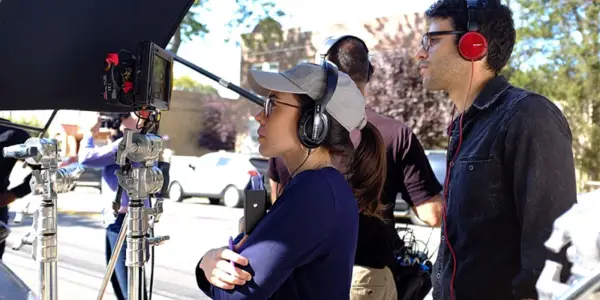Get To Know A Budding Visionary From Puerto Rico, Zoé Salicrup-Junco

Jacqui Blue has a lifetime background in theater and writing.…
Zoé Salicrup-Junco is a young director who was born and raised in Puerto Rico. She left her home to attend NYU’s Tisch School of the Arts where she became an award-winning narrative and commercial filmmaker. Her narrative short films have screened in some of the bigger festivals like Tribeca, Palm Springs, Clermont Ferrand, and HBO NY Latino Film Festival. Salicrup-Junco is a Cinefestival/Sundance Latino Screenwriters Project Fellow, a Sundance Women’s Financing Intensive Project Fellow, and an HBO/DGA Directing Fellowship Finalist. She received top prizes such as the King Screenwriting Award, the Wasserman Directing Award, the National Board of Review Student Grant, and a spot in The Independent Magazine’s “Top 10 Filmmakers to Watch” list for her short film, Gabi. Salicrup-Junco is actively involved with the New York Women in Film & Television Organization, the NYC Women’s Filmmakers Group, and an executive producer at post-production company, Beige.
Most recently Zoé Salicrup-Junco and her crew made an important and impactful short film about the current immigration crisis that tells the story of a woman who share’s the film’s title, Marisol. Marisol is about a single mom trying to get her own business going while needing to make extra money to support her daughter as an undocumented woman in America. She ends up having a chance encounter which forces her to confront the dangers of her present reality, giving her pause for thought regarding her and her daughter’s future.
I recently spoke to the young auteur about her vibrant vision, returning to her home to shoot her first film, her most recent film Marisol and her upcoming short film Maria, which is about the devastating effects of hurricane Maria on Puerto Rico and the rise in suicide rates because of it.
Jacqui Blue for Film Inquiry: What was the inspiration for your first film, Gabi?
Zoé Salicrup-Junco: Gabi was my thesis film at NYU. I had made other short films before, but this was kind of a point of departure. It was the first Spanish film I made and it was also the first film I shot back in Puerto Rico, where I’m from. I think Gabi was a story that had been unconsciously brewing inside of me for a while. I was starting to realize I was going through a sort of a uprooting process. I had left Puerto Rico to pursue my studies in the US and every time I would come back home things just felt different. I was noticing change around me, change that no longer necessarily involved me, and it made me want to hold on to my roots even more. So I imagined this Puerto Rican woman, Gabi, and channeled all these things I was basically feeling through her. She ended up being like a collage of several women in my life.

Marisol is such a powerful short film, was it inspired by someone’s own personal experience? Or was it just inspired by the current events?
Zoé Salicrup-Junco: I didn’t write Marisol, but yes Tim Eliot [the screenwriter] was inspired by current events.
As the director, did you do any rewrites? If you did change anything, how much did your vision differ from the original script?
Zoé Salicrup-Junco: Tim, the screenwriter, was very open to my notes when I came into the project. I didn’t touch the story too much. I just focused on developing Marisol’s character a bit more; adding a solid backstory to really round her out, for example. In the original script we didn’t really learn how Marisol made a living when she wasn’t borrowing her friend’s car. It was important to me that we give her some agency in her life and not just portray her as a victim. So in the final film you see how she’s trying to get her laundry company off the ground, but because of her legal status she can’t quite grow it as fast as she wishes. Thus she has to resort to borrowing her friend’s car to earn the funds she needs to provide a living for her daughter by taxi’ing people via a ride-share app.
What part of the filmmaking process did you enjoy most with this project?
Zoé Salicrup-Junco: I really enjoy all of the creative processes. I love breaking down a script, casting, editing, everything. But I guess if I have to pick one, it’s probably being on set. It’s kind of like showtime. All of the prep you’ve been working for leads you to this day. You’re physically surrounded by all of these filmmakers and the collaboration becomes so tangible.
Did any challenges arise on set?
Zoé Salicrup-Junco: We didn’t have any major complications we weren’t prepared for. A lot of the film takes place inside a car so we were prepared for traffic or getting pulled over, etc. When those things did in fact happen, we just handled them with patience and set our contingency plans in motion.
What conversations do you hope this film will start or impact do you hope it makes?
Zoé Salicrup-Junco: I hope this film impacts people who perhaps don’t understand or don’t pay attention to the serious immigration issues that exist in this country. Thankfully these issues have been making headlines recently, but this has been going on for a long time. I’m a big believer that when you can have someone emotionally connect to a story, their defenses come down and they’re just naturally more understanding to new and foreign concepts. This is a story about a hardworking mom, about family. A lot of people can relate to that, so I’m hoping positive and productive conversations can come out of this.

Overall as a young woman who is a director what has your experience been as a filmmaker so far and what would you say to young girls who aspire to do what you’re doing?
Zoé Salicrup-Junco: It’s tricky for me to give advice sometimes because I still feel like I have so much to learn and grow, but if there’s one thing I always say is whatever you envision yourself doing – do it. Don’t let anybody, including yourself, stop you. Seek out mentors, study people you admire, ask for help. Just put yourself out there and allow yourself to grow. It’s really difficult and risky and most of the times you will fail, but just get back up and keep going.
What other projects are you working on that you can tell us about?
Zoé Salicrup-Junco: I’m developing and working on a few things, but one in particular that I will finish up soon is a short film I wrote and directed called María. It’s about the increase in suicide rates and overall mental health deterioration in Puerto Rico after Hurricane María. It’s a dark yet important issue that in my opinion needs to be talked about more. It’s also a project that gave me a chance to come back home and collaborate with some amazing Puerto Rican filmmakers, so I’m very grateful for that.
You already have a strong voice as a filmmaker, what else would you like to say through your art?
Zoé Salicrup-Junco: My main drive is just to tell personal and meaningful stories that in some way can help someone, whether that’s help them go through something difficult or help them open their minds a bit more to issues they don’t necessarily agree with. In the end, for me, it’s all about establishing personal connections via storytelling and helping move powerful conversations forward.
Film Inquiry would like to thank Zoé Salicrup–Junco for speaking with us!
Does content like this matter to you?
Become a Member and support film journalism. Unlock access to all of Film Inquiry`s great articles. Join a community of like-minded readers who are passionate about cinema - get access to our private members Network, give back to independent filmmakers, and more.
Jacqui Blue has a lifetime background in theater and writing. After achieving international acclaim with her first film Beautiful Births, she was one of 10 Directors selected by James Franco for his Master Class, "Sex Scenes". She went on to work with Jared Padalecki & T.O.N.E-z in her suicide awareness documentary, I Chose Life: Stories of Suicide & Survival and appears on-screen next to Lou Diamond Phillips in The Last Train. www.jacquiblue.net













